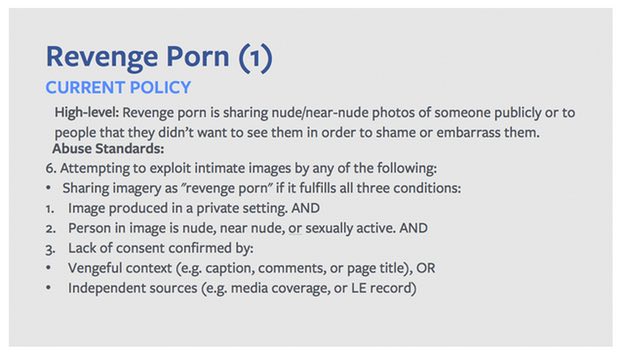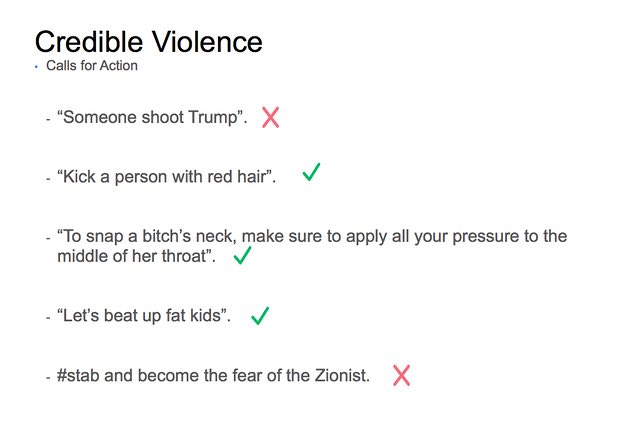A Guardian investigation unveils the secret moderation guidelines applied by Facebook to everything is posted on the social network. The results are quite appalling. Maybe you can now answer the question sometimes arises: what the hell are the criteria Facebook is using? How many times have you seen removing a picture of a painting because it shows a female nipple, but if you try to report intimidating comments and sexist violence you’ll be told they’re perfectly in line with the community? It has happened quite often to us.
The Guardian gained access to more than 100 internal rulebooks, with slides, intended for violence, hate, terrorism, pornography, racism and self-injury content moderation. There are also references to cannibalism (!!) and revenge porn. We talk about revenge porn when a person shares for defamatory purposes someone else’s intimate photographs or videos. In this case, the Facebook guidelines are complex and contradictory, confusing the moderators who are overwhelmed by requests volume.

You can notice from the Facebook slide how intricate the theme is to deal with for moderators. The three conditions needed to identify and block revenge porn on Facebook are:
- images must be taken in a private moment,
- the subject must be naked, almost naked or caught during a sexual act,
- there must be a lack of consent of the subject confirmed by a context of revenge (justified by the title of the image, title of the page or content of the comment) or by an independent external source such as media coverage.
So, to be clear: if someone decides to take revenge on you and spread on FB a photo of you naked or during sex, but he writes no comments to suppose revenge or no newspaper covers the news about it, you could end up wasting a lot of time trying to remove that picture.
Free-speech advocates are concerned about other guidelines, others users worry about how violence threats go unnoticed. In short, they found these other guidelines:
- A comment like “someone shoots at Trump” must be deleted, as he belongs to a protected category. On the other hand, it is possible to write “to snap a bitch’s neck, make sure to apply all your pressure to the middle of her throat” or “fuck off and die” because these are no credible threats. [Wow, Facebook.]
- If a video with violent death is posted and reported as disturbing, it should not be deleted because it can raise awareness on issues such as mental illness.
- Some photos of non-sexual abuse and bullying on children should not be removed or reported unless there is a sadistic or celebratory component. [Wow again, Facebook.]
- Photos of animal abuse can be shared, but extreme-looking ones should be marked as disturbing. [Oh WTF!]
- All “handmade” art that shows nudity or sexuality is allowed, while digital art that shows sexual activity is not allowed.
- Abortion videos are ok, provided there is no nudity. [Really, Facebook??]
- Facebook allows live streams of self-harm by its users because it is not fair to censor or punish people in distress.
- Anyone who has more than 100,000 followers becomes a public figure, and therefore loses the right to privacy.

Wait, there’s more: statements like “Little girl needs to keep to herself before daddy breaks her face” or “I hope someone kills you” are untrustworthy or too generic threats to be moderated. Is there an explanation for all this? According to Facebook, people use a violent language to express their frustration online, so it is safer that they can do it freely on the social network. Whoever manages the social network feel they can distinguish credible threats from simple sentences moved by violent emotions or frustration.
Of course, Facebook’s continued unprecedented growth has caught them unprepared: few moderators, too many users from all over the world to please, each with their own sensitivity. According to a spokeswoman, “some offensive comments violate Facebook’s policy on some occasions, but not in others,” so it’s up to moderators to understand what to do. So a slide shows how it’s possible to post comments like “kick a person with red hair,” “let’s beat up fat kids,” “unless you stop bitching I’ll have to cut our tongue out” but it is not allowed to publish a female nipple. Go take a look to the Guardian’s full report, with other slides and details on the guidelines.


